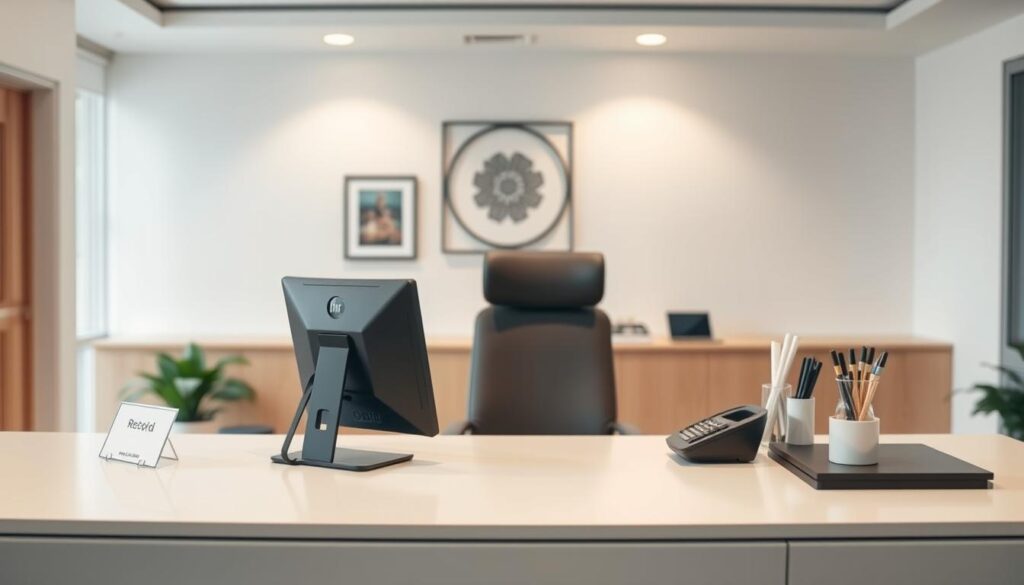As companies transition back to in-person work, the demand for skilled front desk professionals is on the rise. You may be wondering what this means for your career or how you can capitalize on these emerging opportunities.
The return to in-person work is creating a surge in receptionist jobs, as businesses seek to provide a welcoming and organized environment for their employees and clients. This shift is not just about filling a role; it’s about creating a positive first impression and ensuring the smooth operation of the workplace.
Key Takeaways
- The return to in-person work is driving demand for skilled receptionists.
- Front desk roles are evolving to meet the needs of modern businesses.
- New opportunities are emerging for those with the right skills and experience.
- The role of a receptionist is crucial in creating a positive first impression.
- Companies are looking for professionals who can provide excellent customer service and administrative support.
The Resurgence of Front Desk Roles in Post-Pandemic Workplaces
The post-pandemic era is witnessing a significant resurgence in front desk roles. As companies transition back to in-person work, the demand for skilled receptionists is increasing. This shift is driven by the need for a welcoming and organized front office experience.
Current Market Trends and Statistics
Recent job postings indicate a growing demand for receptionists, with companies like Four Seasons Hotels and Resorts leading the way. According to industry statistics, the demand for front desk staff is expected to rise by 10% in the next year. Key trends include:
- Increased emphasis on customer service skills
- Growing need for technical skills, such as proficiency in office software
- Rise in hybrid work models requiring adaptable receptionists
How the Return to Office Policies Are Creating Demand
The return to office policies is driving demand for skilled receptionists. As companies reopen their offices, they require receptionists who can manage the front desk efficiently. This includes handling visitor check-ins, managing phone calls, and performing administrative tasks. The role of a receptionist is becoming increasingly vital in ensuring a smooth and welcoming experience for clients and employees alike.
By understanding the current market trends and the impact of return to office policies, you can position yourself for success in the growing field of receptionist jobs.
Understanding Today’s Receptionist Jobs and Requirements
The modern receptionist job has undergone significant changes, driven by the shift back to office environments. As companies adapt to new workplace norms, the role of receptionists has become more complex, requiring a blend of traditional hospitality skills and modern technical abilities.
Evolution of the Modern Receptionist Role
The receptionist role has evolved significantly from its traditional roots. Today, receptionists are expected to be proficient in various software applications, manage complex scheduling systems, and provide exceptional customer service. This evolution is driven by the need for a more efficient and welcoming front desk experience.
Essential Qualifications in the Post-Pandemic Workplace
In the post-pandemic workplace, receptionists need to possess a mix of technical, communication, and adaptability skills. They must be proficient in using digital tools, handling sensitive information discreetly, and adapting to changing workplace policies. According to recent job postings, employers are looking for candidates who can multitask, manage front desk operations smoothly, and provide a positive first impression.

Industry-Specific Requirements and Expectations
Different industries have unique requirements for receptionists. For instance, in healthcare, receptionists may need to handle confidential patient information and comply with HIPAA regulations. In corporate settings, they might be required to manage visitor check-in systems and coordinate events. Understanding these industry-specific expectations is crucial for both employers and job seekers to ensure the best fit.
Must-Have Skills for Receptionist Success in 2023
To succeed as a receptionist in 2023, you’ll need to possess a combination of technical, communication, and problem-solving skills. The modern workplace is evolving, and the front desk role is no exception. As a receptionist, you’ll be the first point of contact for visitors, callers, and clients, making your role crucial in creating a positive impression.
Technical Skills for the Digital Front Desk
The digital front desk requires proficiency in various software and digital tools. You’ll need to be comfortable using:
- Property Management Systems (PMS) like Opera PMS
- Visitor management systems to efficiently manage visitor check-ins and check-outs
- Email and calendar management tools to coordinate appointments and events
Being tech-savvy will not only make your job easier but also enhance the overall experience for visitors and clients.
Software Proficiency and Digital Tools
Familiarity with software applications is crucial for managing day-to-day tasks. For instance, Opera PMS is widely used in the hospitality industry for managing reservations, check-ins, and check-outs. You’ll need to be proficient in using such systems to streamline front desk operations.
Visitor Management Systems
Visitor management systems are essential for tracking and managing visitors. These systems help in maintaining security and ensuring that all visitors are accounted for. As a receptionist, you’ll need to be adept at using these systems to check-in visitors, print badges, and notify the relevant personnel.
Communication and Customer Service Excellence
Effective communication is at the heart of every successful receptionist role. You’ll need to possess excellent customer service skills to handle inquiries, resolve issues, and provide a welcoming experience for visitors. This includes:
- Clear and friendly communication over the phone and in person
- Active listening to understand and address visitor needs
- Professionalism in handling complaints or difficult situations
Adaptability and Problem-Solving in the Hybrid Workplace
The hybrid workplace demands flexibility and the ability to adapt to changing situations. As a receptionist, you’ll need to be able to:
| Skill | Description | Benefit |
|---|---|---|
| Adaptability | Adjusting to new software, procedures, or unexpected situations | Ensures smooth front desk operations |
| Problem-Solving | Resolving issues promptly, such as handling a missed delivery or a visitor complaint | Enhances visitor satisfaction and security |
By being adaptable and having strong problem-solving skills, you’ll be able to navigate the challenges of the hybrid workplace effectively, ensuring a seamless experience for everyone involved.
“The key to success as a receptionist is not just about answering phones and greeting visitors; it’s about creating a positive and welcoming atmosphere for everyone who walks through the door.”
How to Find the Best Receptionist Jobs in Your Area
Finding the right receptionist job in your area requires a strategic approach to job searching. As you navigate the job market, it’s essential to be proactive and informed about the best ways to discover opportunities that match your skills and career goals.
Effective Job Search Strategies
To land a receptionist role, you need to employ effective job search strategies. Start by defining your job preferences, including location, industry, and work environment. Utilize online resources, such as job search platforms and company websites, to explore available positions. Networking is also crucial; attend job fairs and industry events to connect with potential employers.
Tailor your resume and cover letter to highlight your relevant skills and experience, making it easier for hiring managers to see your potential.
Utilizing Job Boards and Company Career Pages
Job boards and company career pages are valuable resources for finding receptionist jobs. Popular job boards like Indeed, LinkedIn, and Glassdoor list a wide range of receptionist positions. You can filter your search by location, job title, and other criteria to find the best matches. Company career pages are also worth checking, as many organizations list their job openings on their own websites.
Using job boards effectively involves setting up job alerts, so you’re notified about new openings that fit your criteria.
Leveraging Staffing Agencies and Professional Networks
Staffing agencies can provide significant assistance in your job search, offering access to a range of job openings and expert advice on your application materials. Professional networks, including LinkedIn groups and local professional associations, can also be invaluable, providing opportunities to connect with other professionals in your field and learn about job openings.
“Networking is not about just connecting people. It’s about connecting people with people, people with opportunities, and people with ideas.” – Michele Jennae, Professional Networker
By leveraging these resources and strategies, you can enhance your job search and increase your chances of finding the best receptionist job in your area.
Creating a Standout Application for Front Desk Positions
With the resurgence of in-person work, creating a standout application for receptionist jobs is crucial for success. To increase your chances of landing an interview, you need to tailor your application materials to the specific job posting.
Resume Tailoring for Receptionist Roles
A well-crafted resume is essential for making a strong first impression. To tailor your resume, focus on highlighting relevant experience and showcasing transferable skills.
Highlighting Relevant Experience
Emphasize your previous experience in receptionist or related roles. Use specific examples to demonstrate your skills in managing front desk operations, handling phone calls, and greeting clients.
Showcasing Transferable Skills
Even if you don’t have direct experience as a receptionist, you can still showcase transferable skills such as customer service, communication, and organizational abilities. Use action verbs like “managed,” “created,” and “developed” to describe your achievements.
| Transferable Skills | Examples |
|---|---|
| Customer Service | Handled customer complaints, Responded to customer inquiries |
| Communication | Wrote reports, Presented to teams or clients |
| Organizational Abilities | Managed multiple projects, Coordinated events or meetings |
Writing an Engaging Receptionist Cover Letter
Your cover letter should complement your resume by providing a more personal and detailed account of your experience and qualifications. Use this opportunity to demonstrate your enthusiasm for the role and highlight your unique strengths.
Building a Professional Online Presence
In today’s digital age, having a professional online presence is crucial. Make sure your LinkedIn profile is up-to-date and highlights your skills and experience as a receptionist. Consider creating a professional online portfolio or personal website to showcase your abilities.
Step-by-Step Guide to Acing Your Receptionist Interview
Your receptionist interview is an opportunity to demonstrate your capabilities and make a lasting impression. To capitalize on this chance, it’s essential to be thoroughly prepared. This involves understanding the common interview questions, practicing scenario-based responses, and presenting yourself professionally.
Preparing for Common Front Desk Interview Questions
Preparation is key to acing your receptionist interview. Familiarize yourself with common front desk interview questions, such as “How would you handle a difficult caller?” or “What are your strategies for maintaining a organized front desk?” Practicing your responses will help you feel more confident and articulate during the actual interview.
Demonstrating Your Skills Through Scenario Responses
Scenario-based questions are designed to assess your problem-solving skills and ability to handle real-world situations. When responding to these questions, use the STAR method: Situation, Task, Action, Result. This will help you structure your answers clearly and effectively, showcasing your skills and experience.
Professional Presentation and Follow-Up Strategies
Your professional presentation is crucial, from your attire to your body language and communication skills. Ensure you dress appropriately for the company culture, maintain eye contact, and speak clearly. After the interview, send a thank-you note or email to express your gratitude for the opportunity and reiterate your interest in the position.

By following these steps and practicing your skills, you’ll be well on your way to acing your receptionist interview and landing your desired role.
Navigating Salary and Benefits for Receptionist Jobs
As you explore receptionist jobs, understanding the salary and benefits landscape is crucial. With the return to in-person work, the demand for skilled receptionists has increased, leading to a variety of compensation packages across different industries and locations.
Current Salary Ranges Across Industries and Locations
Receptionist salaries can vary significantly depending on the industry, location, and level of experience. For instance, receptionists in the medical field may earn between $17.50/hr to $24.50/hr, while those in corporate settings may have different salary ranges.
| Industry | Salary Range (Hourly) |
|---|---|
| Medical | $17.50 – $24.50 |
| Corporate | $15.00 – $22.00 |
| Legal | $18.00 – $25.00 |
Negotiating Your Compensation Package
When negotiating your compensation package, it’s essential to consider factors beyond just the hourly wage, such as benefits, paid time off, and professional development opportunities. Researching the market rate for your role and being prepared to discuss your skills and experience can help you secure a fair and competitive package.
By understanding the current salary ranges and being prepared to negotiate, you can ensure that you receive a compensation package that reflects your value as a receptionist.
Career Growth: Moving Beyond the Front Desk
As you gain experience as a receptionist, you’ll discover numerous opportunities for career growth beyond the front desk. The skills you’ve developed, from communication to problem-solving, are highly transferable to more senior roles within your organization.

Advancement Pathways in Administrative Careers
You can explore various advancement pathways in administrative careers, such as moving into an office manager role, becoming an executive assistant, or taking on specialized tasks like HR or operations coordination. “The key to advancing your career is to be proactive and seek out opportunities for growth,” says career coach, Jane Smith.
- Office Manager
- Executive Assistant
- HR Coordinator
- Operations Coordinator
Skill Development for Career Progression
To achieve career progression, focus on skill development in areas like technology, data analysis, and leadership. You can take online courses or attend workshops to enhance your skills. For instance, learning software specific to your industry or developing project management skills can make you a more competitive candidate for advanced roles.
By emphasizing skill development and exploring advancement pathways, you can successfully move beyond the front desk and into more challenging and rewarding positions.
Conclusion: Embracing New Opportunities in Receptionist Careers
The return to in-person work has brought new life to receptionist careers, offering a range of front desk opportunities. As companies continue to adapt to hybrid work environments, the demand for skilled receptionists is on the rise.
You can capitalize on these emerging opportunities by developing the skills required for success in modern receptionist roles. Focus on building technical, communication, and problem-solving skills to stay competitive in the job market.
Whether you’re looking to start or advance your career, the current landscape presents a promising outlook for receptionist careers. Explore the latest job openings, and be prepared to seize the new opportunities that come your way.
By staying adaptable and committed to professional growth, you can thrive in the evolving world of front desk opportunities.